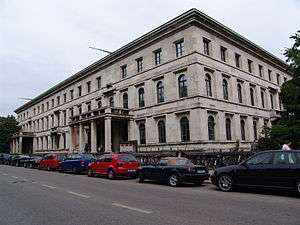Hochschule für Musik und Theater München


The Hochschule für Musik und Theater München (University of Music and Performing Arts Munich) is one of the most respected traditional vocational universities in Germany specialising in music and the performing arts. The seat of the Hochschule is the former Führerbau of the NSDAP, located at Arcisstraße 12, on the eastern side of the Königsplatz. Teaching and events also take place in the locations Luisenstraße 37a, Gasteig, Prinzregententheater (theatre studies) and Wilhelmstraße (ballet). Since 2008 the Richard Strauss Conservatory (de), until then independent, has been part of the Hochschule.
History
First founded in 1846 as a private institute called the Königliches Conservatorium für Musik, it was transformed in 1867 by King Ludwig II into the Königliche bayerische Musikschule (Royal Bavarian Music School) at the suggestion of Wagner. It was financed privately by Ludwig until it received the status of state institution in 1874. It has since been renamed several times; to the Königliche Akademie der Tonkunst (Royal Academy of the Art of Music), the Staatliche Akademie der Tonkunst (State Academy of Music), the Hochschule für Musik (Munich Music College), and finally the Hochschule für Musik und Theater (University of Music and Performing Arts Munich) in 1998. Its original location, the Odeonsgebäude, was destroyed in 1944.
The current building was constructed for the Nazi party by Paul Troost; it was called the Führerbau. Neville Chamberlain and Adolf Hitler signed the Munich Agreement in this building in 1938. Hitler's office, on the second floor above the entryway, is now a rehearsal room, but has been changed little since it was built.
The 1974 Bavarian University Act placed the Munich college, as well as all other Bavarian music colleges, on an educational par with art colleges.
Programmes
The University of Music and Performing Arts Munich offers study programmes in performing and teaching in all music subjects and ballet as well as joint study programmes with the Bayerische Theaterakademie August Everding covering operatic performance, acting, directing, musicals, make-up for the theatre and lighting design.
Former and present staff
- Max Beckschäfer 1988–2001 composition theory
- Diethard Hellmann 1974 choral conducting, 1981–1988 director
- Ernst Haefliger 1971– voice
- Wilhelm Killmayer 1973–1992 composition
- Fritz Lehmann 1953–1956
- Jan Müller-Wieland since 2007 composition
- Miku Nishimoto-Neubert, piano accompaniment
- Christoph Poppen since 2003 violin and chamber music
- Bernd Redmann since 2005 Musiktheorie und Gehörbildung
- Josef Rheinberger
- Max Reger composition from 1905 to 1906
- Rudi Spring since 1999 Lied interpretation
- Bernhard Haas since 2013 organ
- see also Category:Academics of the Hochschule für Musik und Theater München
Alumni
- Valentina Babor
- Jason Barry-Smith
- Nélida Béjar
- Winfried Bönig
- Annette Dasch
- Gabriel Dessauer
- Christoph von Dohnányi
- Claudia Eder
- Rafael Frühbeck de Burgos
- Christian Gerhaher
- Gerold Huber
- Nicolaus A. Huber
- Ricardo Gallen
- Carl Orff
- Bernd Redmann
- Heinz Winbeck
- Carl Valentin Wunderle
- see also Category:Hochschule für Musik und Theater München alumni
Honorary doctorates
- Hans Werner Henze 2004
See also
External links
| Wikimedia Commons has media related to Hochschule für Musik und Theater München. |
- Homepage
- Bayerische Theaterakademie August Everding
- Effects of the Bologna Declaration on Professional Music Training in Europe
- European Association of Conservatoires (AEC)
Coordinates: 48°08′46″N 11°34′04″E / 48.14611°N 11.56778°E
|